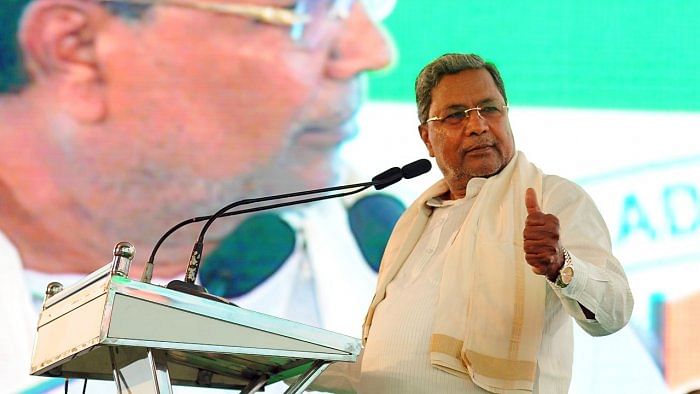
Chief Minister Siddaramaiah chaired a meeting with senior finance officials, Rayareddi and Revenue Minister Krishna Byre Gowda who represents Karnataka in the GST Council to discuss the stand the state should take before the 16th Finance Commission.
Credit: DH File Photo
Chief Minister’s Economic Advisor Basavaraj Rayareddi on Friday said that Karnataka’s share in the divisible pool of taxes (horizontal devolution) can increase from 3.64% to 5.24%, even as he sought a hike in vertical and horizontal devolution for the state in its memorandum to the Arvind Panagariya-led16th Finance Commission.
The 16th Finance Commission is scheduled to visit Karnataka on August 29.
On Friday, Chief Minister Siddaramaiah chaired a meeting with senior finance officials, Rayareddi and Revenue Minister Krishna Byre Gowda who represents Karnataka in the GST Council to discuss the stand the state should take before the 16th Finance Commission.
At the meeting, Rayareddi said Karnataka should bat for vertical devolution to increase from 41% to 50%.
Further, Rayareddi said that Karnataka’s share in the divisible pool of taxes (horizontal devolution) can increase from 3.64% to 5.24%.
Speaking to DH, Rayareddi said his suggestions were discussed during the meeting. “It is up to the finance department to incorporate my suggestions in the final memorandum,” he said.
Rayareddi pointed out that Karnataka’s share in the divisible pool was fixed at 4.71% under the 14th Finance Commission (2015-16 to 2019-20). This dropped to 3.64% under the 15th Finance Commission (2020-21 to 2025-26). Due to this reduction, Karnataka will lose approximately Rs 62,098 crore, he said.
“Increasing vertical devolution to states from 41% to 50% should become a national discussion. I’ve told the CM to consider this,” Rayareddi said.
The Commission will cover a five-year period starting April 1, 2026.
The Siddaramaiah administration has created a special cell to prepare its pitch to the 16th Finance Commission. It comprises former 14th Finance Commission member M Govinda Rao, retired IAS officer M R Sreenivasa Murthy (he headed the 6th state pay commission) and Narendar Pani from the National Institute of Advanced Studies.
In its memorandum to the 16th Finance Commission, Karnataka is likely to seek inclusion of cess and surchage in the divisible pool of taxes. “If the Centre agrees to this demand, even at the current devolution rate of 3.7%, the state will get an additional Rs 19,240 crore,” Rayareddi said.
According to sources, Karnataka is likely to stick to its argument that “destination states” must be rewarded for receiving migrants from lesser-developed states.
The government will also seek corrections while calculating income distance, which is the per-capita GSDP of a state compared with that of a state with the highest per-capita GSDP.